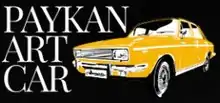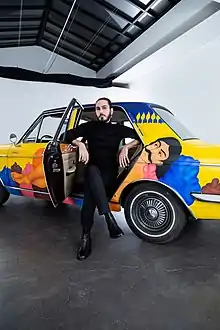PaykanArtCar
PaykanArtCar is a non-profit organization and art project, based in the US. It is focused on human rights issues in Iran.

The car
The non-profit organization, based in Florida, has purchased a car, now also called the PaykanArtCar, and intends to let different Iranian activist artists work on it as an art project, meant to highlight various political issues and repressed communities in Iran. The car is an Iranian Paykan, gifted in 1974 by Shah Mohammad Reza Pahlavi of Iran to Nicolae Ceaușescu, dictator of Romania. It was bought at an auction in 2021 for €95 000.[1][2][3]
2021

The art car was first exhibited in October 2021 at the Oslo Freedom Forum in Miami, held by the Human Rights Foundation (HRF).[2] The first artist to paint the car was Alireza Shojaian, an exiled Iranian. Shojaian, working with an airbrush for the first time, took inspiration from the story of Rostam, a legendary Persian hero, the art of 20th century Iranian artist Hossein Qollar-Aqasi, and connected them to the 2021 murder of the gay Iranian Ali Fazeli Monfared,[4][5] as well as the executed Iranian wrestler Navid Afkari.[2] Shojaian said
The aim of this edition of the PaykanArtCar is to shed light on the deadly abuse of LGBTQIA+ people in Iran, a problem that has been repeatedly denied by the regime and neglected by Iranian society, including in the diaspora.[6]
The organization received the Václav Havel Prize for Creative Dissent from the HRF, who said that the car was "a daring piece of art that advocates for human rights and dignity in Iran."[7][8]
The car has been exhibited in Canada and Brussels, Belgium.[9][10][11] It was meant to be shown at AsiaNow, an art fair in Paris,[12] but the invitation was revoked.[4][13] A representative of AsiaNow stated that
The problem is neither the artist nor the project, but the organization supporting this project, which uses the L.G.B.T.Q.+ cause for priority reasons that are other than purely artistic, and which endanger the safety of the people working with us on our Iranian platform."[2]
2023

The second installment of the PaykanArtCar was first shown in Oslo, Norway, outside the Oslo Concert Hall, in June 2023. This installment was created by Simin Keramati, Iranian-Canadian artist.[14][15] She covered the car with women's hair, with the intent that the art project shall raise awareness of the struggle of Iranian women, as well as pay tribute to the death of Mahsa Amini and the following Mahsa Amini protests.[16][17] Keramati said
The Paykan car itself, the canvas for this installation, is a typically masculine element in Iranian society. Covering this classic national car with natural women’s hair, I appropriate this figure as a female body.[18]
Women's rights activist Masih Alinejad, present at the unveiling, said
We are here to say that all this hair symbolizes the brutality of this gender apartheid regime. ... I ask Norwegian women to touch and feel this hair. Think you could be killed for this. Just a little hair can get you killed in 21st century Iran.[16]
People
PaykanArtCar was founded by Mark Wallace, American ambassador to the United Nations 2006–2009, and Hiva Feizi, the organization's executive director.[1][2][19]
See also
- BMW Art Car, another car related art project
- LGBT rights in Iran
References
- Gosh, Bobby (4 June 2022). "Iranian Artists-in-Exile Find a Vehicle for Protest". Bloomberg News. Retrieved 25 November 2022.
- Berk, Brett (1 November 2021). "To Protest Iran's Anti-Gay Abuses, an Artist Painted a Dictator's Car". The New York Times. Retrieved 25 November 2022.
- Stroude, Will (16 March 2022). "Iran's national car given homoerotic makeover to make a stand against anti-gay persecution". Attitude. Retrieved 27 November 2022.
- Jarrell, Zachary (3 January 2022). "The PaykanArtCar is putting LGBTQ+ rights for Iranians on the map". Los Angeles Blade. Retrieved 25 November 2022.
- Gordon, Daphne (10 December 2021). "Alireza Shojaian's art painted on a vintage Iranian Paykan car challenges Middle Eastern ideals of what it means to be a man". Toronto Star. Retrieved 25 November 2022.
- Shojaian, Alireza (2021). "Alireza Shojaian". PaykanArtCar. Retrieved 6 August 2023.
- Anderson, Becky (27 May 2022). "CNN.com - Transcripts". CNN. Retrieved 26 November 2022.
- Malak, Tony (23 June 2022). "Art in Protest at the 2022 Oslo Freedom Forum". Human Rights Foundation. Retrieved 26 November 2022.
- Taylor, Kate (23 November 2021). "Artist Alireza Shojaian protests Iran's anti-LGBTQ stance through his transformation of a vintage Iranian car". The Globe and Mail. Retrieved 25 November 2022.
- Bashar, Baharak (10 November 2022). ""Zan, Zendegi, Azadi": PeykanArtCar, een voertuig voor mensenrechten in Iran". DeWereldMorgen (in Dutch). Retrieved 25 November 2022.
- "PaykanArtCar exhibit rolls into Montreal to drive home message of dignity for Iranian people". CTV News. 11 March 2022. Retrieved 25 November 2022.
- Williams, Keegan (6 October 2021). "PaykanArtCar Uses Art and Advocacy for Human Rights in Iran -". Out Front. Retrieved 27 November 2022.
- Nogara, Louise (19 October 2021). "La PaykanArtCar censurée au Paris Asian Art Fair 2021 ?". La Règle du Jeu (in French). Retrieved 27 November 2022.
- Toosi, Nahal (18 June 2023). "Activists say the human rights movement is failing". Politico. Retrieved 3 August 2023.
- Blanco, Patricia R. (6 August 2023). "Un coche cubierto con pelo de iraníes o tiques de ropa con el rostro de presos uigures: propuestas artísticas para denunciar la represión". El País (in Spanish). Retrieved 6 August 2023.
- Paust, Thomas (13 June 2023). "Denne bilen er tildekket av kvinnehår: – Mullaene skjelver". Nettavisen (in Norwegian). Retrieved 3 August 2023.
- Castello, Claudio (15 June 2023). "Hårprotest utenfor Oslo konserthus". Utrop. Retrieved 3 August 2023.
- Keramati, Simin (January 2023). "Simin Keramati - Artist Statement". PaykanArtCar. Retrieved 6 August 2023.
- "Hiva Feizi". PaykanArtCar. Retrieved 27 November 2022.
External links
- Official website
- PaykanArtCar: A Driving Force Against Human Rights Abuses Tours Canada, sponsored 2021 article at ARTnews, with pictures
- Car Virtual Video, 2022 video by PaykanArtCar
- Prize winning car art with a message to Iran, 2022 interview with Hiva Feizi on Radio National
- 2023 PaykanArtCar Honors the Woman, Life, Freedom Movement in Iran, sponsored 2023 article at ARTnews, with pictures